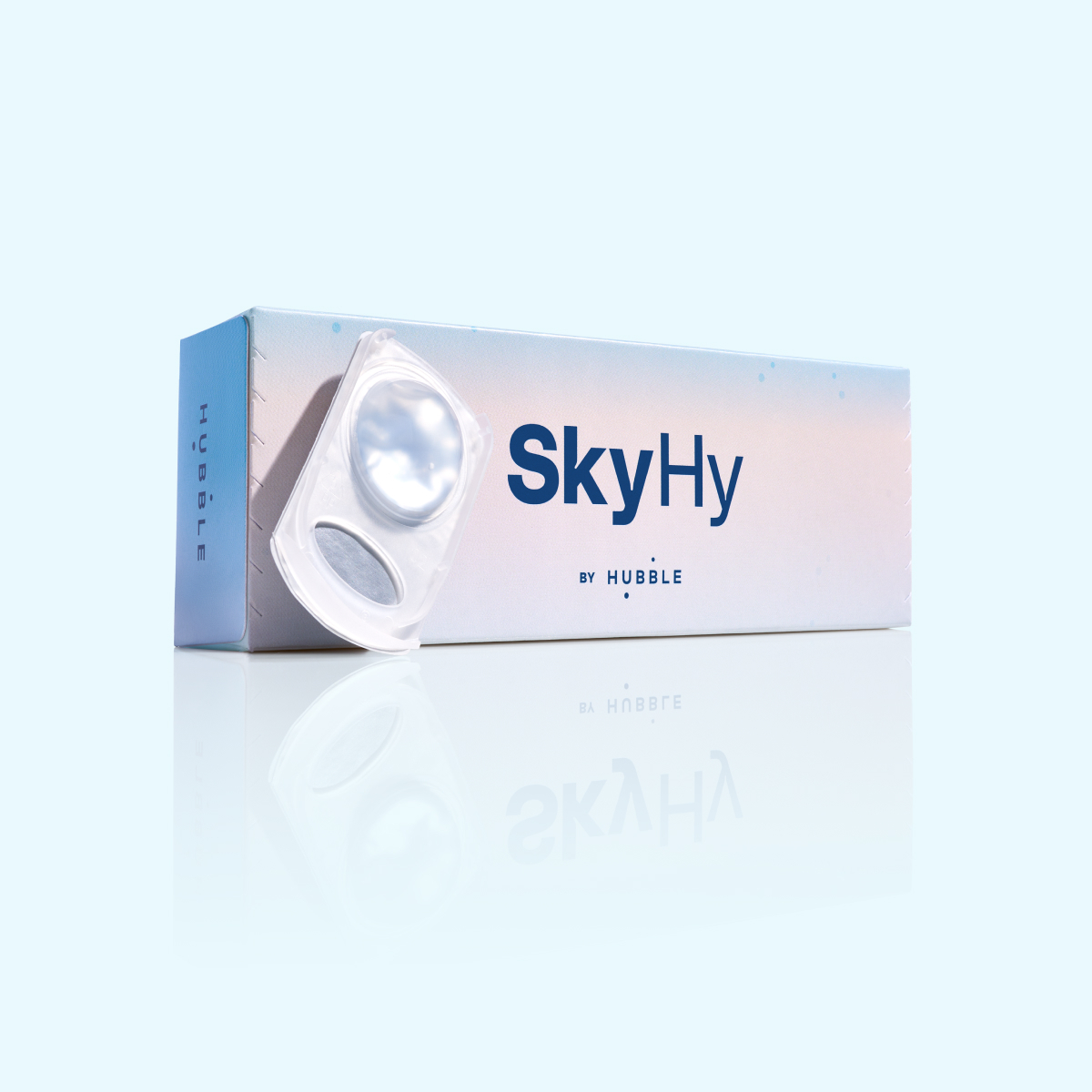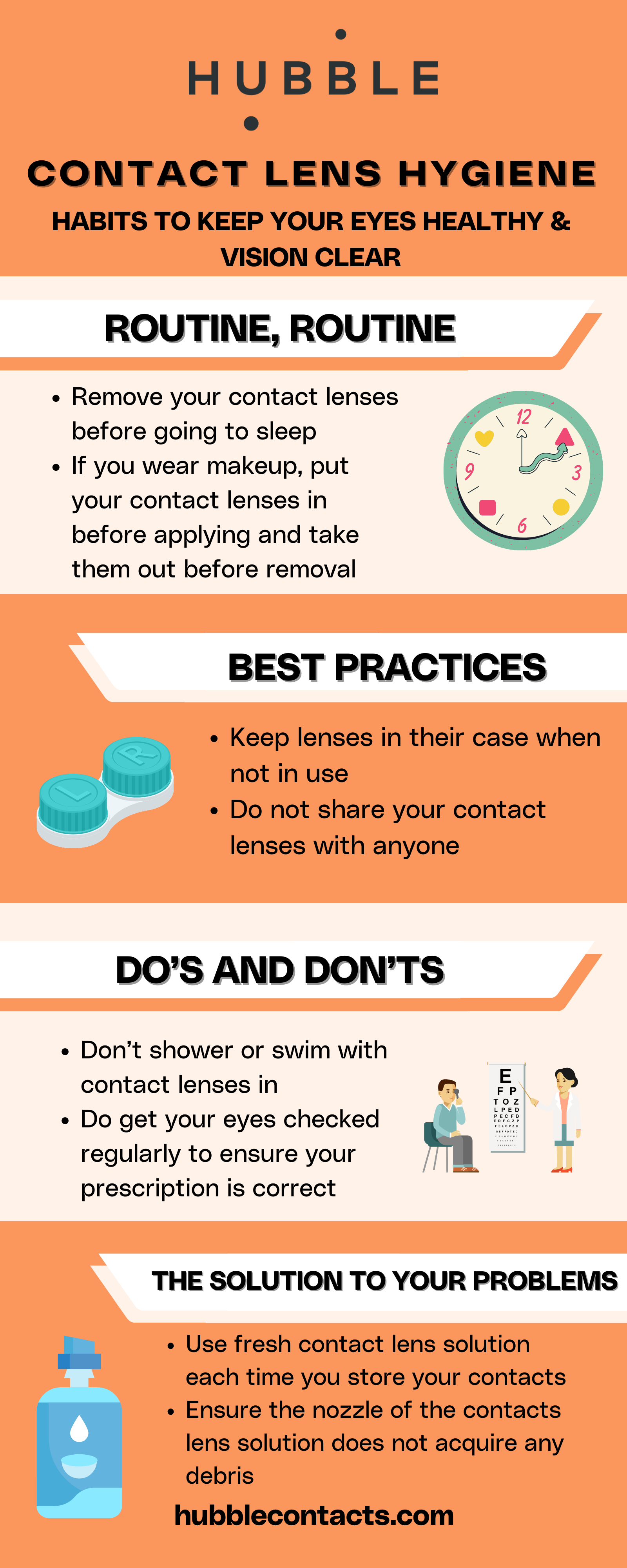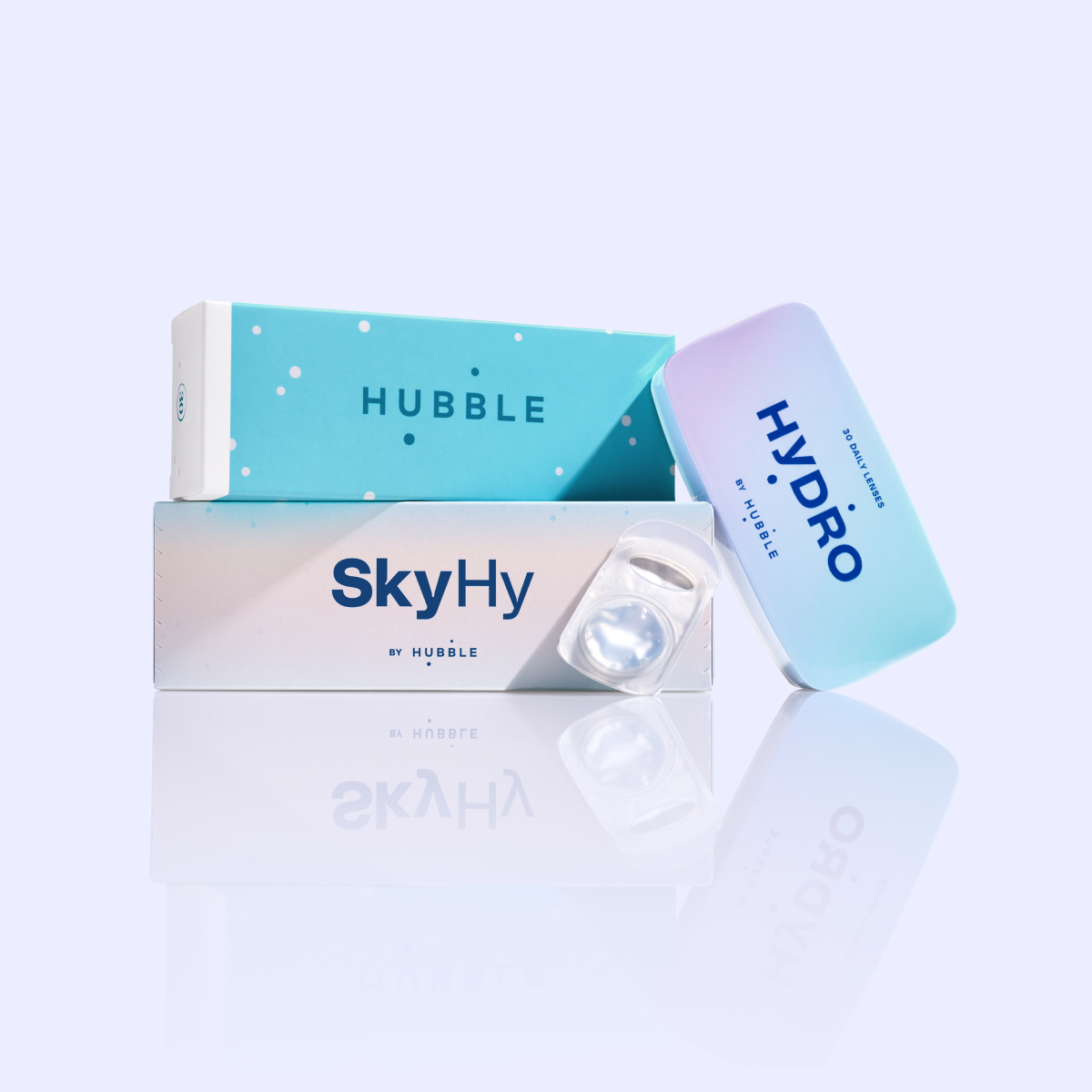Can Contact Lenses Cause Eye Infections? Keeping Your Eyes Healthy

When you begin wearing contact lenses, you do so with the understanding that proper eye care and maintenance is a part of your routine. Good hand washing practices before and after handling contacts, proper storing of contacts, and contact case cleaning are consistent practices to keep your contacts wearable and comfortable for use.
Avoiding eye infection from contacts and other complications for your eyes as a contact lens user is the goal. You will note that regular eye exams and vision care appointments ensure that your prescription is up to date. Proper fit and appropriate prescriptions are additional proactive means to avoid eye discomfort, eye pain, or infections.
The use of daily contacts through a subscription with Hubble is an easy, convenient option that can minimize the risk of eye infection. Dailies are contact lenses that are used and disposed of every day, which can help reduce issues like irritation or blurriness. Given that dailies are only meant to be worn for one day, this helps enhance comfort and lower the chances of dry eyes, irritated eyes, or eye infections just to name a few benefits. In general, proper use of contact lenses and the following best practices leave you at a very low risk of suffering an eye infection or any adverse effects. In this article, we’re breaking down all the ways you can keep your vision clear and your eyes healthy while wearing contacts.
The Link Between Contact Lenses and Eye Infections: Can You get Eye Infection from Contacts?
In general contact lenses are not bad for your eye health: wearing them properly and following best practices means eye infections from contact lens use are extremely rare. Contact lens wearers need to follow the prescribed guidelines provided by their eye care professionals. This includes proper hygiene practices, regular cleaning and disinfection of lenses, and adherence to recommended wearing schedules. Regular eye check-ups are also crucial to monitor eye health and detect any issues early.
If you experience symptoms of an eye infection, such as redness, pain, discharge, or blurred vision, promptly remove your contact lenses and seek professional advice from an eye care professional. Immediate attention and appropriate treatment can help prevent the progression of the infection and potential complications.
What Causes Contact Lens Eye Infections?
To reduce the risk of a contact lens eye infections associated with contact lens use, it's crucial to follow the prescribed wearing and cleaning practices. The following represents common ways eye infections can occur:
Poor hygiene - Failing to wash hands thoroughly before handling contact lenses can introduce bacteria, viruses, or fungi to the lenses and, subsequently, the eyes.
Eye Infection from Sleeping in contacts - Extended or overnight wear of contact lenses, especially those not designed for continuous wear, can reduce the amount of oxygen reaching the cornea and create an environment conducive to bacterial growth.
Not cleaning or replacing lenses as recommended - Failure to clean, disinfect, and replace contact lenses according to the prescribed schedule can lead to the accumulation of debris, protein deposits, and microorganisms on the lenses.
Using tap water or homemade saline solutions - Contact lenses should be cleaned and stored in recommended solutions. Using tap water, homemade saline solutions, or saliva can introduce harmful microorganisms to the lenses and eyes.
Wearing expired lenses - Contact lenses have an expiration date, and using them beyond that date can lead to a breakdown of the lens material, making it more susceptible to bacterial adhesion and infection.
Sharing contact lenses - Sharing lenses with others increases the risk of transferring microorganisms between wearers, potentially leading to eye infections.
Using damaged lenses - Scratched or damaged lenses can create openings for bacteria to enter the eye. It's essential to inspect lenses regularly and replace them if damaged.
Ignoring proper storage - Contact lens cases should be kept clean, and the solution should be changed regularly. Dirty cases can harbor bacteria, leading to contamination of the lenses.
Skipping regular eye exams - Regular eye check-ups with an eye care professional are essential for monitoring eye health, identifying potential issues early, and ensuring the correct prescription.
Eye Infection from Sleeping in Contacts: Understanding the Risks
Sleeping in contact lenses or use of contacts for an extended period, especially those not designed for continuous wear, can reduce the amount of oxygen reaching the cornea and create an environment conducive to bacterial growth.
The combination of reduced oxygen levels and the warmth of closed eyes during sleep creates a favorable environment for the growth of bacteria and other microorganisms on the surface of the contact lenses. This increases the risk of bacterial contamination and infections, such as microbial keratitis.
Contact lenses can absorb moisture from the eyes. During sleep, the natural lubrication provided by blinking is reduced, exacerbating the dryness. Prolonged wear, including overnight use, can contribute to irritation and an increased risk of developing dry eye syndrome. With this in mind, consider silicone hydrogel lenses, a more advanced, breathable contact lens material. SkyHy by Hubble contact lenses are crafted from silicone hydrogel to enhance oxygen flow and breathability.

Proper Contact Lens Hygiene: Key to Preventing Infections
To keep your eyes healthy and free from infections or complications, there are several simple habits that you can get in the habit of. We’ve compiled our top tips for contact lens use and infection prevention below:
- If you wear makeup be sure to put your contacts in first to prevent makeup from transferring to the contact lenses
- At the end of the day, remove your contact lenses first before removing makeup.
- Remove your contact lenses before swimming or getting into a pool.
- Never shower with your contact lenses in.
- Do not sleep with your contact lenses in.
- Keep your contacts in the contact case when not in use.
- Be sure to periodically clean your contact lens case as well to remove any protein deposits or potential bacteria.
- Always ensure that the nozzle of the contact lens solution does not get any debris or anything on it
- Use fresh contact lens solution each time and store your contacts in your case. Dispose of old solutions before storing your contact lenses. Note that contact lenses should never be rinsed or stored in water.
- If you have dry eyes, do not use over-the-counter eye drops as a quick fix. Use only doctor-prescribed eye washes made for contacts.
- Do not share your contact lenses with anyone.
- Get your eyes checked regularly to ensure you always have the correct prescription.
- Above all, if you're ever unsure about the process of using contact lenses or you experience any eye-related issues or symptoms, be sure to contact a medical professional for assistance.

Advantages of Daily Disposable Contact Lenses for Eye Health
Daily contacts or dailies is beneficial and promotes better eye health since contact lenses are changed every day, which can help reduce issues like irritation or blurriness.
Hubble offers hassle-free, contact lens ordering with a personalized subscription service. Lowering your risk of eye infections can start with Hubble contacts that are conveniently delivered to your door. Hubble makes ordering contact lenses easy and at a great value. Start your subscription for just $1 with our Classic by Hubble starter pack.
Recognizing and Addressing Eye Infections
Recognizing the signs of an eye infection is crucial for seeking prompt medical attention and preventing potential complications. Common signs of an eye infection include:
Redness - The whites of the eyes may appear red or bloodshot.
Itching or Irritation - Persistent itching or irritation in the eyes can be a sign of infection.
Pain or Discomfort - Pain, soreness, or discomfort, particularly when blinking, can indicate an eye infection.
Tearing or Watery Eyes - Excessive tearing or watery eyes may be a response to irritation or infection.
Swelling - Swelling around the eyes, eyelids, or under the eyes can occur with an infection.
Discharge - Unusual discharge from the eyes, such as pus or a yellowish or greenish fluid, may indicate an infection.
Sensitivity to Light - Increased sensitivity to light, known as photophobia, can be a symptom of certain eye infections.
Blurred Vision - Vision may become blurred or cloudy in the presence of an eye infection.
Foreign Body Sensation - Feeling as if there's a foreign object or sand in the eye can be a sign of irritation or infection.
If you experience any of these symptoms, it's important to:
- Remove Contact Lenses
- Avoid Rubbing Your Eyes - Rubbing the eyes can exacerbate the irritation and spread infection.
- Wash Your Hands - Thoroughly wash your hands with soap and water before touching your eyes or face.
- Avoid Self-Medication - Do not use over-the-counter eye drops without consulting with an eye care professional.
- Seek Professional Help - Schedule an appointment with an eye care professional, such as an optometrist or ophthalmologist, for a thorough examination and appropriate treatment.
When to Consult an Eye Care Professional
Prompt and proper treatment is essential to manage eye infections effectively and prevent potential complications. If you suspect you have an eye infection or experience persistent eye symptoms, consult with an eye care professional as soon as possible.
Choosing Hubble for Healthy Eyes and Clear Vision
To reduce the risk of eye infections associated with prescription contact lens use, it's crucial to follow the prescribed wearing and cleaning instructions provided by an eye care professional, practice good hygiene, and seek prompt medical attention if any signs of infection or irritation occur. It is also important for contact lens wearers to follow the recommended wearing schedule provided by their eye care professional.
The subscription process that Hubble curates ensures your contact lenses arrive on time on a recurring basis, so you never run low. Learn more about our range of contact lenses online offerings, and get the most out of your lenses today by starting your subscription!



